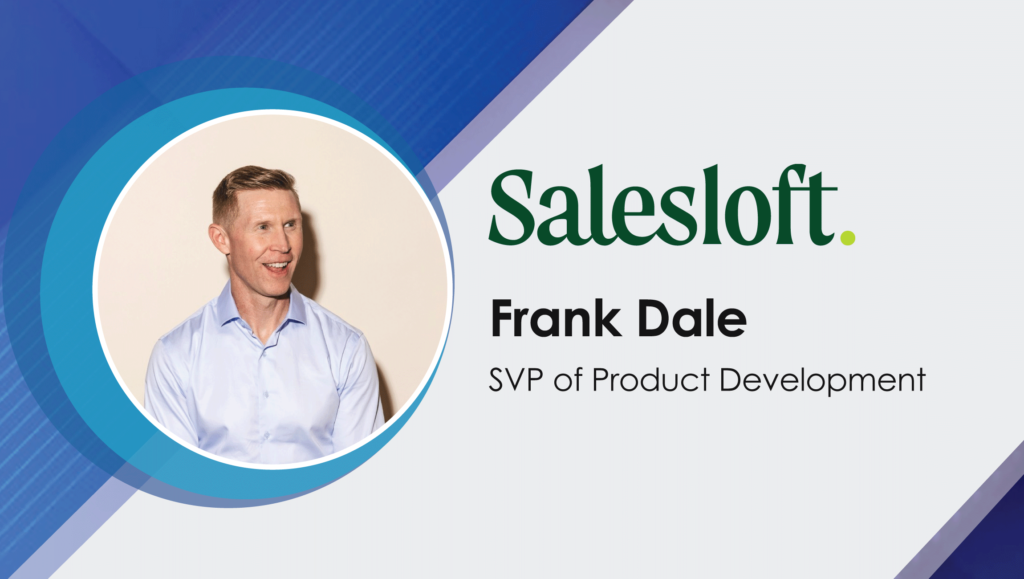Frank Dale, SVP of Product Development at Salesloft joins us a second time around to highlight more about Salesloft’s four Vs Sales Approach:
_________
Welcome back to this SalesTechStar chat Frank, it’s an interesting time for revenue and sales teams as they try to navigate a complex/recessionary period: what do you feel sales teams can do more of during this time to drive business output?
As we face widespread economic uncertainty, efficiency is top of mind for sales leaders. Businesses should be reevaluating the tech they’re using and considering solutions that allow their sales teams to do more with less.
Right now, too many sellers spend too much time on administrative tasks. In fact, only 30% of their time actually goes toward selling. Not only are sellers wasting time on admin work, but it’s contributing to them missing their number. Getting more out of your time, team and tech has to be a priority for businesses right now. I like to call it the three Ts.
- Get more out of your time: Do only the things that fuel the pipeline and close more deals – and not the busy work that kills productivity and steals away important selling time.
- Get more out of your team: With budgets tightening and headcounts declining, businesses have to do more with less. This means only focusing on the highest leverage opportunities, which are your best fit accounts and deals. This isn’t the moment to chase blue sky deals.
- Get more out of your tech: You can’t afford to have your tech stack holding you back. Tech stacks are bloated with single-point solutions that over-promise, under-deliver, don’t work well together, and sellers won’t use. The answer is to simplify, consolidate, and streamline.
Businesses need to be investing in comprehensive platforms that facilitate prospecting, deal management, sales coaching, and forecasting all from the same place. This technology is table stakes for companies who want to hit their revenue targets and remain competitive. I expect to see sales engagement technology become a non-negotiable in 2023.
We’d love to hear from you about Salesloft’s four V’s approach and how it can enable a better B2B sales process.
The four Vs approach borrows the first three Vs from Doug Laney’s Big Data Principles: Volume, Velocity, and Variety. At Salesloft, we like to add a fourth V: Veracity. These Vs offer an accounting-like guide on how to think about and deliver on a consolidated data solution capable of providing the big picture.
- Volume: Volume is our data completeness across the buyer journey. With data from thousands of businesses ranging from small businesses to the largest of enterprise customers, Salesloft offers industry benchmarking and best practices. This data also allows us to build value through improved AI solutions. These AI solutions require LOTS of data to provide relevant results.
- Velocity: Velocity is system responsiveness to user data inquiries and the ability to deliver the right information to the right user at the right time. Velocity dramatically decreases if you have to go from your forecasting tool to your sales engagement tool, then to your call recording software. Salesloft allows you to do everything in one platform, decreasing the time spent moving between apps and tools.
- Variety: Variety is about having a richness of data across cohorts and segments. The ability to analyze and compare cohorts provides insights for process improvements. These insights are only possible with full-cycle sales data consolidated in one platform. For us at Salesloft, this is making data available in a variety of ways such as data features Salesloft Coaching, In-App Analytics, options for data exports, a Salesforce Insights package, and a public API to access data.
- Veracity: Data efforts are wasted if accuracy (veracity) is ever an issue. Veracity is where data consolidation work can go astray, especially when you are combining data from different sales tools. Consolidated data offers continuity.
By following the Four Vs approach, sales teams have a front-seat to the ever-evolving buyer’s journey.
Read More: SalesTechStar Interview with Mike Carpenter, CEO at XFactor
For B2B salespeople at the cusp of revamping their core sales strategies to meet new year goals: what tips would you share?
Sales has always been about building relationships. And no matter what technology you implement to help facilitate the sales process, you will find the most success when you pair the right tools with the sales methodologies that help you gain a deep understanding of your customer and what matters to them.
At Salesloft, there are two methodologies our sales team uses to guide our understanding of our prospects and what their needs are:
- Design Thinking: A customer-centric way of approaching sales based on empathy and relationship-building. Design Thinking requires sellers to do more than just pitch products. It’s about digging deep and looking at the customer through their lens, not your own.
- MEDDPICC: A sales qualification methodology that helps sellers ensure they are focusing on the right deals and that they know what they need to do to win them.
These methodologies push sellers to ask themselves and their prospects meaningful questions that create a deeper understanding of their customers and help deliver a more personalized, highly relevant buying experience.
Strategically building relationships in combination with data-based insights from a sales engagement platform will ensure sales teams are spending their time and energy on the deals that are most likely to close, improving conversion and win rates.
How can B2B sellers today use their data and insights more effectively to ensure better prospecting efforts that meet customer sentiments and needs?
Data consolidation can be a challenging and never-ending endeavor for sales teams. It’s incredibly difficult and time-consuming to try to piece together all the data around sales activities, pipeline, sales conversations, etc., especially when it’s coming from so many different tools in different formats. It can make seeing the big picture feel like a jigsaw puzzle.
Sure, it is possible to do it on your own, but it’s a major investment of time, resources, and discipline to pull it together into a single, cohesive view and do the proper analysis to make it meaningful and actionable.
My advice? Invest with a partner that can synthesize that information and deliver you the insights so you know where and why to take action. Redeploy your time and resources on revenue-generating activities rather than in the operational overhead of trying to create that one source of truth.
A few dominant features and trends that will command the B2B sales and salestech ecosystem through 2023?
The recent economic downturn made 2022 a particularly tough year for sellers. They still had quotas to hit while their buyers navigated similar effects of a down economy.
As we enter 2023, we will likely see a continuation of the current economic climate, meaning sellers will still be challenged when it comes to connecting with buyers, getting deals closed, and ultimately driving revenue for their business.
Here are my top predictions for trends that will dominate the sales ecosystem in 2023:
1. Selling in this climate requires a deep understanding of your customer. Sales frameworks that help sellers get to the heart of their buyer’s problems and demonstrate how they can solve those problems will be central to sales strategies. It isn’t enough to have the right frameworks…you have to make it easy for your team to execute on them. Great sales technology like Sales Engagement platforms make it easy to implement, execute, and measure success with your sales framework.
2. CFOs are going to be the most important stakeholder when it comes to purchases and budgeting decisions in 2023. That means sellers are going to have to articulate the ROI in ways that a CFO cares about. This means you need to be able to clearly articulate how your solution directly helps a company increase revenue, reduce costs, or eliminate risks like customer churn. CFOs want to see actual numbers and improvements their company can expect like increased win rates, fewer hires needed, or more comprehensive technology that can replace 2 or 3 other technologies in a way that lowers overall spend.
3. Tech stack consolidation will be the name of the game in 2023. Revenue teams will continue to struggle if fundamental problems in the tech stack aren’t addressed. Sellers and operations leaders agree: sellers are drowning in tools. With a dozen tabs open and data fragmented across tools, reps get frustrated and details like follow-up start to slip. The tech industry has done a disservice to the profession of sales. Thousands of companies have created point solutions that address micro problems without considering the complete seller workflow and experience. Companies are realizing they can’t get the results they want by continuing to work with a cobbled-together tech stack.
Read More: Make your Business Smarter with Field Service Technology
Salesloft, a leading Sales Engagement platform, helps sales teams drive more revenue. It’s the one place where sellers can go to execute their digital selling tasks, communicate with buyers, understand what to do next, forecast with accuracy, and get the coaching and insights they need to win more deals.

Frank Dale is SVP Product Management at SalesLoft. Prior to that he was the CEO and co-founder of Costello, which was acquired by SalesLoft. He has served as either CEO or COO at several investor backed software companies including Compendium, which was acquired by Oracle. None of this matters to his 6 year old son who wants to know when we’re getting a dog.
He is a graduate of Valparaiso University where he earned a BA and an MA with a concentration in ethics and received an MBA from the Kelley School of Business at Indiana University.
Missed The Latest Episode of The SalesStar Podcast? Have a quick listen here!
Episode 151: Driving Growth Across e-Tail with Kate Musgrove, Managing Director for Asia Pacific, Bazaarvoice
Episode 150: The Future of Customer Success with Allison Tiscornia, Chief Customer Officer at ChurnZero
Episode 149: Sales Practices and Tips For Recessionary Times with Ed Hill, SVP – EMEA at Bazaarvoice






















